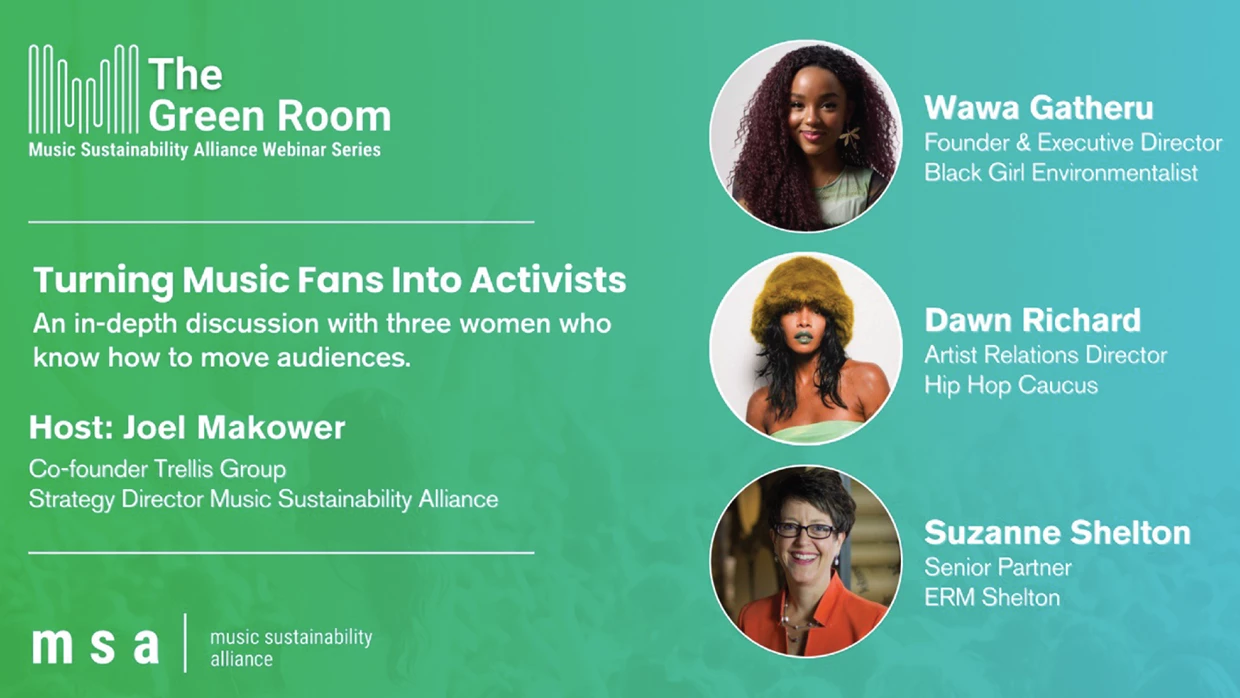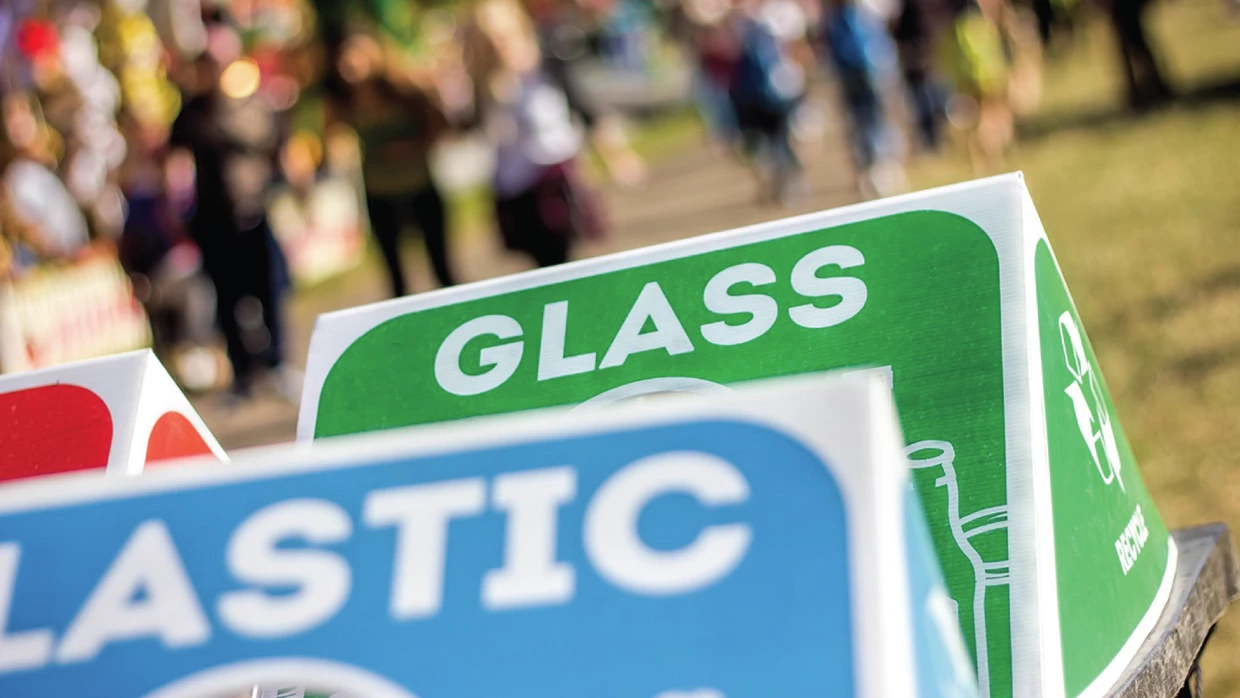
Join us at The Music Sustainability Summit on February 5th in LA!
This is the first-ever music industry climate summit in North America, uniting industry professionals, sustainability leaders and science experts to discuss the eco issues ...

In our commitment to fostering a more sustainable music industry, PRG was excited to share insights from "The Green Room," a new webinar series presented by the Music Sustainability Alliance (MSA). This series explored the vital intersection of sustainability and the music industry, featuring expert panelists who discussed innovative practices and actionable strategies for driving positive change.
The inaugural episode, hosted by MSA Strategy Director Joel Makower, dove into the unique power artists held in influencing their fans' values and behaviors. With a focus on advocacy in today's complex social landscape, this session featured insights from notable guests, including Wawa Gatheru, Founder and Executive Director of Black Girl Environmentalist; Dawn Richard, Cultural Producer and Artist Relations Director at the Hip Hop Caucus; and Suzanne Shelton, President of Shelton Group. Join us as we highlight the top ten takeaways from this enlightening discussion, aimed at turning music fans into passionate activists for a greener future.
1. The Generational Context of Climate Change: Wawa emphasized that Gen Z and Gen Alpha were the first generations to grow up with the concept of climate change as a backdrop. This long-standing awareness shaped their understanding and urgency regarding environmental issues. She pointed out that while there was recognition of the climate crisis, there had often been a disconnect in communicating its immediate impacts versus framing it as a futuristic problem.
To bridge this gap, artists and advocates should focus on sharing relatable narratives that connect climate issues to the everyday experiences of these younger generations. By emphasizing tangible, real-world effects—such as extreme weather events or local environmental changes—communicators can foster a sense of urgency and empowerment among young people. Encouraging collaboration between artists and youth-led initiatives can also help amplify these messages, ensuring that the voices of the next generation are heard and that they feel equipped to act in addressing the climate crisis.
2. Engaging Affected Communities: Dawn stressed the importance of connecting with communities directly impacted by climate change. Considering the current hurricane crisis in the southeastern U.S., her advice feels more poignant than ever. Individuals in these communities are facing the immediate consequences of climate change in a big way. Dawn advocated for artists to amplify the stories of these communities, as their lived experiences can drive awareness and inspire audiences to act.
3. The Power of Storytelling: Dawn emphasized the importance of storytelling in music as a tool for addressing climate change. By incorporating climate-related themes into their lyrics and narratives—whether through a single lyric in a song or a plot point in a television show—artists raised awareness and inspired action among their audiences.
4. Support for Independent Artists: Dawn highlighted the growing influence and creative freedom of independent artists, who leveraged their platforms to advocate for climate action without the constraints often faced by major label artists. She believed that these artists were uniquely positioned to implement sustainable practices and messaging, making them valuable allies in the fight for environmental justice.
5. Creating Educational Spaces: Dawn called for the establishment of safe and supportive spaces where artists could learn about climate issues and their impacts. By fostering open dialogue and education, artists gained the confidence to engage with these topics, ultimately empowering them to use their voices for advocacy.

6. Intersection of Climate and Music: Wawa emphasized the significant overlap between music and climate activism, drawing from her personal journey as a singer-songwriter. She highlighted how artists possessed the power to influence their audiences and foster climate conversations through their work. Citing her experience as a Climate Consultant for artists like Kehlani, Wawa demonstrated the potential for music to serve as a relatable medium for addressing environmental issues. Additionally, she advocated for creating opportunities that connected artists with climate experts, enabling meaningful dialogues that equipped musicians with the knowledge and tools necessary to leverage their platforms effectively for climate advocacy.
7. Show, Then Tell: Suzanne emphasized the importance of demonstrating sustainability practices before discussing them. Artists should have implemented visible eco-friendly actions—such as carbon-neutral events and reusable cups—before speaking about their commitment to sustainability. This approach built credibility and provided a tangible reference point for their audience, helping to avoid misunderstandings that could arise from empty rhetoric.
8. Creating a Branded Initiative: Suzanne proposed the idea of establishing a branded sustainable initiative, such as a "Low Carbon Event" certification. This program would have provided artists, labels, and venues with a clear framework for implementing sustainable practices at their events. By promoting this branding, the music industry could raise awareness among consumers about the commitment to sustainability, fostering a sense of equity and recognition around eco-friendly initiatives.
9. Infrastructure for Eco-Friendly Behavior: Suzanne stressed the need for visible recycling and waste management infrastructure at events. When attendees were unable to recycle or see their waste properly managed, it led to feelings of guilt and frustration. By providing clear systems for waste disposal, venues and artists could create a more enjoyable experience for fans while encouraging them to participate in sustainable practices.
10. Narrative and Leadership Crises: Wawa identified two significant challenges in the climate movement: a narrative crisis and a leadership crisis. She critiqued the over-reliance on apocalyptic themes and fear-based messaging, arguing that these approaches could be ineffective in fostering sustainable action. Instead, she advocated for a narrative that embraced optimism and the potential for positive change. Additionally, she highlighted the lack of diverse representation among decision-makers in climate spaces, calling for greater inclusivity.
